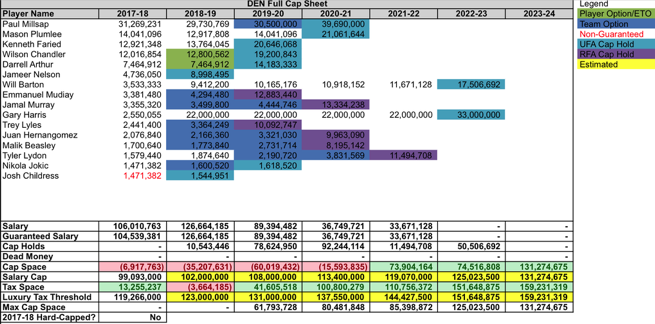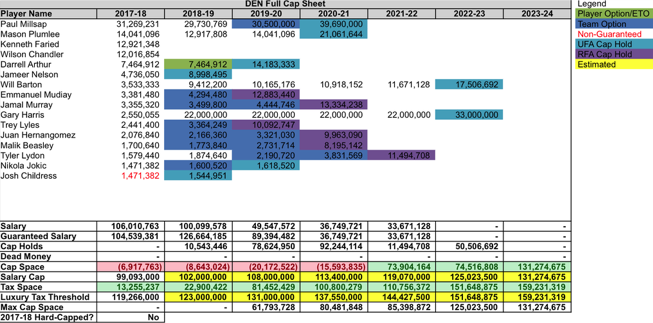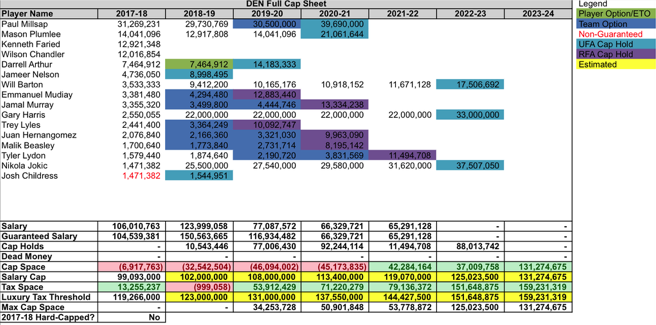© 2026 ALLCITY Network Inc.
All rights reserved.

While October 16th marks the first day of the 2017-18 NBA regular season, it also represents a deadline of sorts for the Denver Nuggets. The 16th of October is the final day to extend any players on rookie contracts that are extension-eligible, specifically Gary Harris.
After Adrian Wojnarowski of ESPN reported that the Nuggets had re-signed Mason Plumlee to his new three-year deal worth $41 million he also added this tidbit to the end of his article:
“The Nuggets will next turn their attention to working toward a rookie contract extension for guard Gary Harris.”
Extending Harris was somewhat expected but then Chris Haynes of ESPN reported that the Nuggets are working on an extension with Will Barton as well, which is intriguing, to say the least.
That sparked a wave of speculation; most of which consisted of something to the effect of, “now that Plumlee is re-signed and the Nuggets are pursuing extensions for both Harris and Barton how will the organization have money to re-sign the rest of their young talent, especially Nikola Jokic?”
Strategically. That is how.
To explain how the Nuggets have methodically set themselves up for future financial success, we will have to play the hypothetical game, but first, there are a couple wrinkles to explain.
First and foremost, this article will be assuming that Harris signs an extension that pays him $88 million over four years. It is quite possible that Harris signs for less money but being that this is a look into the future financial forecast of the Nuggets I am assuming an overpay to be conservative.
When it comes to Barton, he is not able to sign an extension for more than 120% of his current contract or 120% of the Estimated Average Player Salary, which is $7,843,500 per year. If he chooses to extend with Denver, being that he is not coming off of a rookie deal, the best contract Barton is allowed to sign is a four-year deal worth $42,116,656 and has till June 30th to sign his extension.
If you keep the Nuggets roster exactly as it stands and add in the speculative extensions for both Barton and Harris this is what the Nuggets cap sheet looks like:
Given the potential new deals for Barton and Harris are extensions, they will not alter the financial situation of the Nuggets this year but if the Nuggets went into the 2018-19 season with the roster unchanged they would be $3.66 million into the projected luxury tax, before maxing out Nikola Jokic, when including the extensions for Barton and Harris with the new contact for Plumlee.
Being in the luxury tax prior to signing Jokic sounds unbelievably dire but the Nuggets’ President of Basketball Operations, Tim Connelly, is far too savvy to let that situation occur. Connelly left avenues to create cap space at very particular times to retain the young core in Denver despite giving out two potential extensions and a new contract in the summer leading up to the 2017-18 season.
Let’s try and look at the situation through Connelly’s eyes.
Wilson Chandler, at the end of the 2017-18 season, will have a player option and will be turning 31-years-old. Odds are, if he stays healthy, that Chandler will opt-out of his $12.8 million option and try to cash in on what is likely his last big payday. Getting Chandler to opt-out of the final year of his contract would clear $12.8 million in cap space in 2018-19.
Then comes the big step; finding a way to move on from Kenneth Faried. The fact the Nuggets have been trying to trade Faried is old news. What changes the dynamic is what Faried said at media day on Monday morning.
“There are 29 other teams. If this team doesn’t want or respect me enough to play me the minutes or whatever that I’m going to play or that I deserve to play, then I understand that” Faried said. “There’s 29 others. Maybe I go somewhere else and do what I need to do there.”
That is, quite clearly, Faried proclaiming that he wants to be traded. If Denver can find a way to move on from Faried, in addition to Chandler opting-out, suddenly Denver is $23 million below the luxury tax as you can see below.
Clearing both Faried and Chandler from the books allows Denver to be able to give Jokic a max contract, which would be a deal worth no more than 25 percent of the Nuggets’ cap space, regardless of if he makes an All-NBA team or not.
The reason why is because the “Rose Rule”, which would have allowed Jokic to make up to thirty-percent of the Nuggets’ cap, does not apply to Jokic purely because he would be coming off of his third full season and not his fourth. So the largest contract Denver can offer Jokic is four years and would be worth $114.24 million.
With both Harris and Barton extended, Faried and Chandler cleared from the books, and a max contract for Jokic this is what the Nuggets future cap breakdown would look like:
Even with both extensions, the re-signing of Plumlee, and maxing out Jokic the Nuggets are still just $1 million into the luxury tax. That is easily avoidable by either convincing Darrell Arthur to opt-out of the final year of his contract worth $7.46 million, or by shedding one of Emmanuel Mudiay or Trey Lyles.
Even if the Nuggets extend both Harris and Barton there are very clear ways for the Nuggets to remain out of the luxury tax and still keep their core intact. The Nuggets will be able to give Jokic the max contract that he deserves while also keeping money open for Jamal Murray when he comes extension-eligible in 2019-20 when the Nuggets have just $66 million in guaranteed salary and $45 million in available cap space based on current projections.
Connelly knows exactly what he is doing as President of Basketball Operations for the Denver Nuggets. He is always thinking three steps ahead and because of that Denver will be able to keep their core intact for the foreseeable future.
(H/T Jeff Siegel of The Step Back and Peachtree Hoops for the salary cap sheets and contributing to this piece).
Comments
Share your thoughts
Join the conversation







